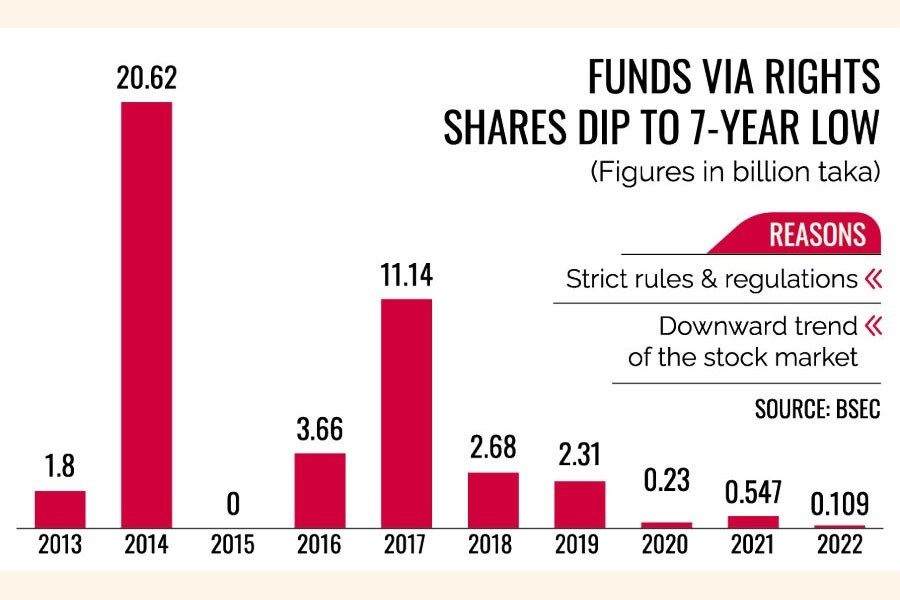The seven-year-low fund raised via rights shares this year has been blamed largely on the tightening of regulatory measures, but experts believe the decline happened to the advantage of investors with the fund abusers dissuaded.
The authority has also been cautious in giving approval to companies willing to issue rights shares. The depressed market is another factor that discouraged companies from expanding business in the suppressed economy.
In August this year, the stock market regulator cancelled an application by First Security Islami Bank to offer rights issues.
The bank considered issuing one rights share for existing two shares to raise Tk 4.98 billion for what it said was to strengthen its capital base to meet the capital requirement set by the Bangladesh Bank.
According to the Bangladesh Securities and Exchange Commission (BSEC), the applicant was devoid of a nomination and remuneration committee, which is mandatory.
Another concern was that the bank's shares were traded near the face value and so the additional shares, if allowed, would have diluted the value of the existing shares in the stock market.
Sinobangla Industries, a manufacturer of plastic packaging products, in late October put out its plan to raise Tk 200 million through rights issues.
Several listed firms have been turned down as they failed to meet the criteria, a merchant banker said.
Also, the regulator is conservative when it comes to allowing companies to issue rights shares at a premium to the face value.
"Conservative pricing is good for existing shareholders but not attractive for companies," the merchant banker said.
A rights issue is an invitation by a listed company to existing shareholders to purchase new shares at a discount to the market price within a stipulated time. This is how investors get to increase their exposure to the stock at a discounted price while the company raises funds to pay off its debts or to expand business.
Only one firm -- Sonali Paper & Board Mills -- raised Tk 109.82 million this year via 10.98 million rights shares at Tk 10 each for purchasing new equipments.
New regulatory measures
The BSEC last year amended the rules relevant for rights issues and included some conditions as well to ensure more transparency.
A listed firm must have recorded profit for at least a year prior to the offering and there is a three-year lock-in period for shareholders with 5 per cent or higher stakes, according to the latest amendment.
Before the issuance of rights shares, the company has to fully utilize funds that came from previous IPO or proceeds of the earlier rights issue. And the rights shares have to be fully underwritten and the issuer should hold annual general meetings regularly.
The securities regulator is also forbidden to allow rights shares if the company's sponsor-directors have failed to hold jointly minimum 30 per cent shares and individually 2 per cent stake in the firm.
Moreover, the new provisions require that the issuer or any of its directors is not a bank-defaulter, and that the issuer has been rated by a credit rating company if the offer is at a premium to the face value. The financial statements of the company should also conform to the International Accounting Standards.
Examples of abuse
Experts support the tough stance taken by the regulatory body as they believe it has prevented the repetition of abuse or misuse that had happened.
Delta Spinners, Tallu Spinning Mills, FAS Finance, First Finance, Midas Financing, Keya Cosmetics and Golden Son have been struggling to maintain their business growth though they promised an expansion with the funds collected via rights shares.
Delta Spinners raised Tk 917 million in April 2014. In 2018, the securities regulator fined all the directors of the company Tk 0.01 million each as it did not use the proceeds for the reasons mentioned in the offering.
Tallu Spinning Mills, which raised Tk 428 million in 2012, has been ranked down to a junk stock. It has not given any dividend to its investors since 2015.
Insufficient document
In the last two years, the stock market regulator rejected applications by at least four listed companies -- AB Bank, IFIC Bank, Dragon Sweater, and Western Marine Shipyard -- for varied reasons, including insufficient documents.
BSEC Executive Director and spokesperson Mohammad Rezaul Karim said the commission would not allow anything that might hurt the interests of general investors.
Prof Abu Ahmed, a former chairman of the economics department of the University of Dhaka, said fundamentally weak companies had taken advantage of the scope of rights issue and that the regulatory stance was right to discourage abuse or misuse of funds via rights shares.
The persistent bleak scenario in the stock market is also a reason why the regulator remains cautious and is reluctant to approve of rights shares.
The secondary market has remained low against the backdrop of global and domestic economic slowdown. Rising inflation and energy prices and depreciation of taka against dollar reined in the growth of businesses.
The DSEX, the key price index of the premier bourse, fell 7.65 per cent or 517 points to close at 6,239 on Sunday. The average daily turnover slumped to Tk 6.70 billion till date, registering a 55 per cent drop year-on-year.
In 2014, nine listed firms raised Tk 20.62 billion through 775 million rights shares, the highest in the market's history, according to data from the BSEC.
The big jump led to no rights offering approved the following year.


